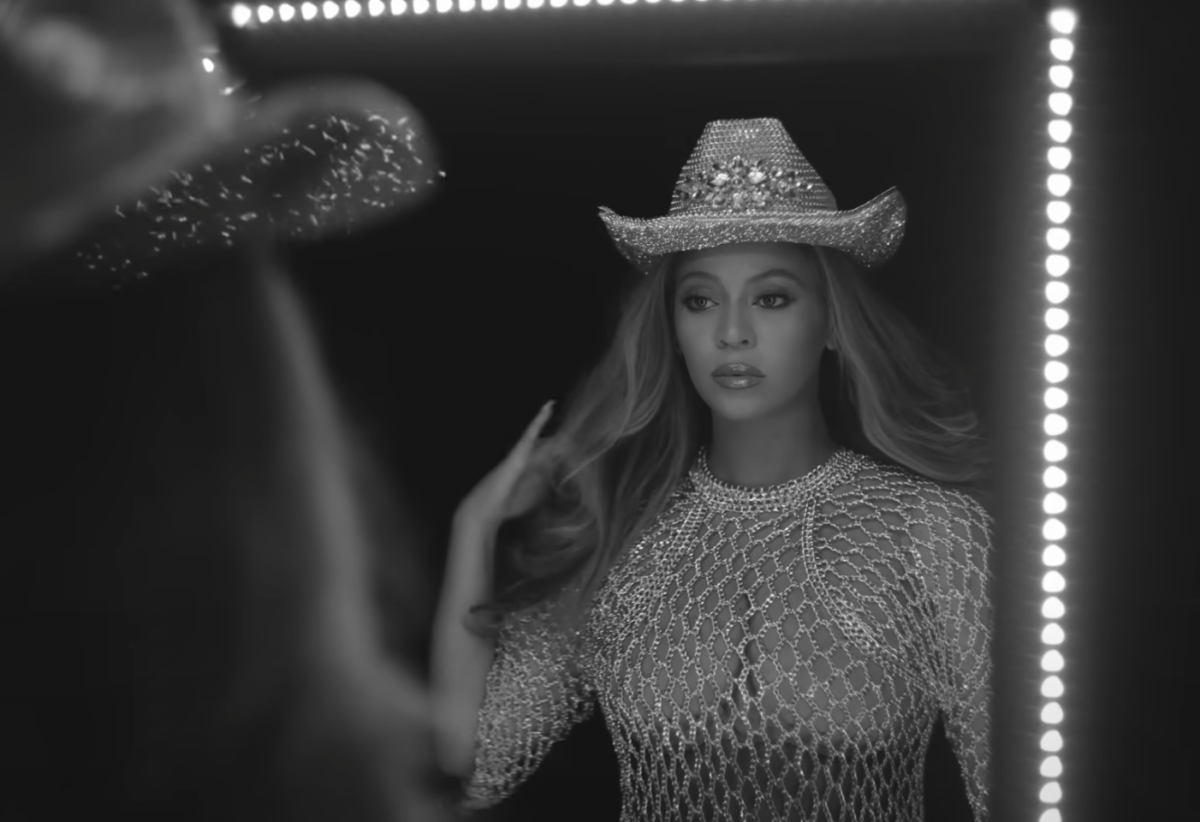On Feb. 11, I was glued to the TV watching the Kansas City Chiefs and the San Francisco 49ers play in Super Bowl LVIII. I was peacefully watching the commercials during the break when I suddenly saw Beyoncé in a Verizon commercial. “Wait a minute,” I thought to myself, “Beyoncé doesn’t just do a commercial.” It was then, at the end of the commercial, when Beyoncé said, “Okay, they ready. Drop the new music,” that my entire world was blessed with the launch of “Act II” of “Renaissance.”
When Beyoncé released “Renaissance” in 2022, she stated that the album was the first act of what would be a trilogy. Her new singles, “16 Carriages” and “Texas Hold ‘Em” tease what her eighth studio album has in store. What the songs, along with the visuals, have confirmed is that the new album, set to release on March 29, will be a country album. Beyoncé previously experimented with country music on “Lemonade” with her song “Daddy Lessons,” but her entrance into the country scene is highly anticipated to bring more recognition to the genre’s roots in the African diaspora.
Country music is often associated with white Southern musicians and audiences, but African Americans have contributed significantly to the genre. For example, the banjo, an instrument that is integral to country music, was originally an African instrument that was brought to America by enslaved Africans. Additionally, blues, a genre that came from experiences of African Americans in the South, played a crucial role in shaping the sound of country music, as well as introducing foundational lyrical themes of love and heartache. For Beyoncé to enter the country scene as a Black woman would be calling attention to the overlooked impact African Americans have had on shaping the genre. While African Americans have contributed significantly to country music, their success within the genre has faced barriers due to racial prejudice and systemic racism. Beyoncé’s presence within country music will challenge existing stereotypes and narratives about who belongs in country music, thereby opening doors for more representation and diversity within the genre.
Both singles make bold entrances with starkly contrasting moods. “16 Carriages” is a sentimental, pulsing country ballad that is a reflection on growing up. In the song, Beyoncé sings of a stolen childhood from the pressures that come from being forced to grow-up at a young age. The song definitely gives eldest daughter syndrome, but also touches on themes of perseverance as she sings, “Ain’t got time to waste, I got art to make/I got love to create on this holy night/They won’t dim my light all these years I fight.” The song is purely Beyoncé: confident, vulnerable and resilient.
Paired with “16 Carriages” is “Texas Hold ‘Em” — the more playful and upbeat co-lead single. The song is opened by a bouncing banjo, carried by an acoustic guitar, and supported by a steady, simple drum beat. The song beams with classic country elements, but more than anything, it feels like the South. As someone from the South, I’m no stranger to the normalized racism that plagues the entire region of the US, but people often miss the South’s rich diversity and community. Beyoncé truly embodies the aspects of diversity and community of the South in “Texas Hold ‘Em” as a Black woman reclaiming a genre dominated by white men. Country is the sound of the South beloved for its storytelling lyrics, and for Beyoncé to transition to this genre after the first act’s tribute to queer Black music shows a consistent goal of the Renaissance trilogy: reminding everyone what white culture has stolen from Black culture.
Beyoncé is giving credit where credit is due through the “Renaissance” trilogy, but should she have to? As a Black woman who has shaped the music industry while also facing the pressure of representing not just Black artists, but Black female artists in the industry, doesn’t Beyoncé carry enough as it is? Here’s my take: I think she’s the only one that can do this. Her entrance into country music is a powerful statement that will reverberate through the corridors of music history. Beyoncé is beyond any genre (and any human in my opinion). Everything that Beyoncé does carries a weight and strength that only Beyoncé can create, and for a good reason too — she’s Beyoncé.



